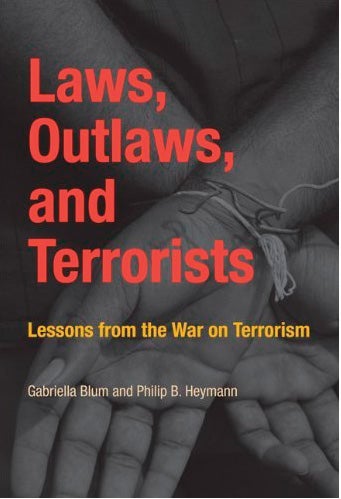 Along the way, they challenged each other, discovered points of agreement, and realized that they had something new to say about law and national security. “Laws, Outlaws, and Terrorists: Lessons from the War on Terrorism” (MIT Press, 2010) is the outcome of that collaboration and in October received an award from the Chicago-Kent College of Law.
Along the way, they challenged each other, discovered points of agreement, and realized that they had something new to say about law and national security. “Laws, Outlaws, and Terrorists: Lessons from the War on Terrorism” (MIT Press, 2010) is the outcome of that collaboration and in October received an award from the Chicago-Kent College of Law.
In prose that satisfies the expert’s craving for depth, the lay reader’s need for clarity, and the demands of both for nuance, Blum and Heymann concede that the two dominant security paradigms—domestic criminal law and the laws of war—were not designed to address terrorism. But they reject the Bush administration’s national security claim of unchecked executive power, which they call the “No Law Zone.” They argue that as we develop a third legal paradigm, we can and should be guided by the principles underlying the rules of domestic criminal law and the laws of war, and adopt rules for terrorism based on those principles. The authors illustrate their approach in chapters examining targeted killing, detention and interrogation.
But Blum and Heymann also acknowledge the limits of law. They examine when counterterrorism actions might be legal but unwise, or illegal but necessary. And they devote the last section of the book to nonlegal concerns: negotiating with terrorists and reducing support for terrorism within the Muslim world. Their conclusion is sobering: We must accept that we can’t reduce the risk of terrorism to zero. We must prepare, mentally and logistically, for the next attack. If we do these things—if we control our fear—we’ll be less likely to overreact, which itself carries its own damaging consequences.
